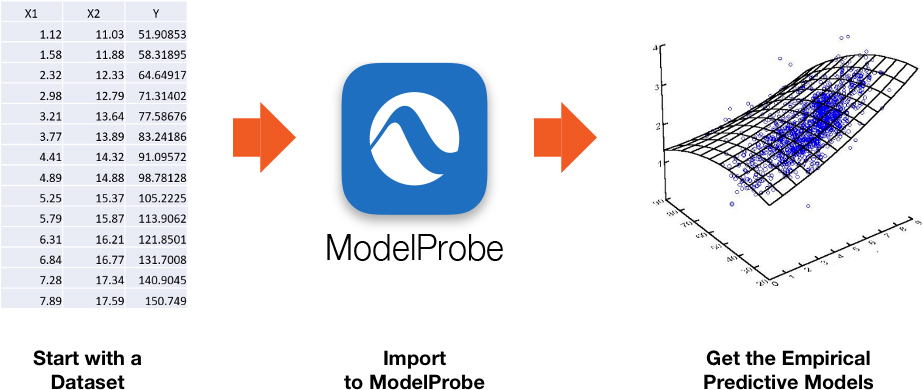Bring Your Data to Life
ModelProbe™
Empirical Process Modeling
Ensure prediction with precision by using ModelProbe to construct empirical predictive models using your available data. Construction of accurate and reliable predictive models is a vital step in using Probabilistic Technology to predict process and product performance.
ModelProbe enables you to: construct numerous potential models; analyze, verify, and validate the potential models and select candidate models; and finally select one or more predictive models for further use in your probabilistic analysis and design.
Key Features
Integrate with UNIPASS and SPISE
ModelProbe can be used as a standalone tool or in combination with our general-purpose probabilistic engines, UNIPASS and SPISE for performing simple to complex predictive analyses. Key features of ModelProbe include the ability to:
- Import and integrate data from various sources with different formats;
- Construct empirical predictive models with an unlimited number of variables and associated cross terms;
- Construct empirical process models for any random process using our proprietary methods and techniques;
- Perform evaluation of the empirical models using the analysis results, including: various graphs, ANOV, statistics of regression variables, statistics of regression coefficients, residual analysis, and prediction interval analysis, and more; and
- Perform comprehensive verification and validation of candidate models to determine whether these models are suitable for performing probabilistic analysis and design including the following 12 criteria:
- R-Square,
- P-Value of Parameter Estimates,
- VIF (Variance Inflation Factor),
- White’s General Test,
- Condition Number of Hat Matrix,
- Maximum Residuals,
- Hat Diagonal,
- Cook’s D,
- Durbin-Watson D,
- Shapiro-Wilk Test,
- Residual Plots vs. the Predicted Values, and
- Residual Plots vs. the Independent Variables.
In general, a predictive model is a mathematical expression relating the process performance to a set of observable process variables and a set of unobservable model parameters.
A proper framework for model assessment is provided by Bayesian Updating Rule capabilities in our SPISE Platform. The process of model assessment amounts to estimating the unobservable model parameters based on a set of measurements of observable process variables and associated process performance.
Our SPISE Platform allows you to combine previous information about model parameters with new information obtained from observed data to model the uncertainties associated with model parameters and update the predictive models. This approach will significantly improve the prediction of your probabilistic analysis.
Learn More
Connect with us for a demonstration on how Predictive Technology can take the stress and strain out of your most rigorous business dilemmas.
Learn More
Connect with us for a demonstration on how Predictive Technology can take the stress and strain out of your most rigorous business dilemmas.
Related Solutions
Tough Times Require Smart Decisions
In these pandemic times, businesses need to be creative and resourceful with less. Our business solutions help you do more than ever all while protecting your valuable resources. We may have the solution you have been looking for. Schedule a consultation with one of our professionals to get started.








